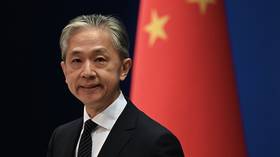Here’s what makes Blinken’s job in China especially difficult
“Overcapacity” and “dual-purpose trade” are catchphrases to hide the fact that Washington is getting trounced in the economy of the future
US Secretary of State Antony Blinken arrived in China on Wednesday to kick off a three-day trip. It is reported that he will speak with his Chinese counterpart and potentially with President Xi Jinping. As the New York Times reported, quoting officials privy to the visit, one of the main topics will be China’s alleged support of Russia, which includes the supposed sale of weapon components and dual-use products. It also comes at a time of increased tensions.
Relations have shown a flicker of warmth since US President Joe Biden and Xi’s encounter at the 30th Asia-Pacific Economic Cooperation summit in San Francisco last year. However, this visit comes sandwiched between significant moves by the Biden administration.
On the one hand, Biden recently signed off on a hefty military aid package for Ukraine, Taiwan, and Israel, coupled with a divest-or-ban provision for the Chinese social media juggernaut, TikTok. On the other, a historic trilateral summit involving the US, Japan, and the Philippines hints at potential formal military collaborations down the road, with the US deploying medium-range missiles in the Philippines, a move with unmistakable implications for China.
Blinken’s trip also follows closely on the heels of Russian Foreign Minister Sergey Lavrov’s recent visit to China, which coincided with US Treasury Secretary Janet Yellen’s presence in the country. Lavrov’s visit underscored the enduring bond between Russia and China, while Yellen’s seemed to foreshadow potential trade tensions over what Beijing perceives as baseless accusations of “overcapacity.”
Behind the diplomatic niceties lies a deeper agenda: the concerted effort by the US and some of its allies to curb China’s economic and technological ascent. This was laid bare when EU officials on Tuesday executed unannounced raids on the offices of a Chinese company in Poland and Denmark.
The European Commission said that its “unannounced inspections” are based on “indications that the inspected company may have received foreign subsidies that could distort the internal market pursuant to the Foreign Subsidies Regulation.” Despite this explanation, it appears the EU is mirroring Washington’s growing scrutiny of and hostility against Chinese firms. The EU’s alignment with the US on trade policy, particularly regarding China, signals a loose front aimed at constraining China’s global economic reach.
The issue of Russia is also another excuse to limit China. The bilateral partnership has been extraordinarily beneficial for both sides: their trade reached a record $240.1 billion in 2023, and Russia’s economy grew by 3.6% the same year despite Western sanctions. The International Monetary Fund (IMF) predicts Russia’s economy will grow faster than all advanced economies in 2024.
This is due in no small part to trade with China, the world’s second-largest economy, but it’s also due to the fact that many other large countries, such as Brazil and India, have not joined Western sanctions on Russia – they just aren’t trading in strategic sectors of the economy like China is. But even in those sectors, the US and its allies have never revealed evidence that Beijing is directly helping Russia’s war effort in Ukraine.
What it’s really about was revealed in 2021 when US Commerce Secretary Gina Raimondo stated bluntly that “we (the US) need to work with Europe” to “slow down China’s rate of innovation.” Even during the administration of former President Donald Trump, the US was strong-arming European countries to implement bans on Huawei and attempting to bully others into signing public tenders with US companies over Chinese competitors.
The idea was that without the ability to compete globally, Chinese firms in the high-tech sphere would inevitably become less profitable and, thus, less innovative. But this is not the case, in fact. While Western countries attempt to control the narrative with accusations of unfair trade practices and military equipment sales, the reality is that Chinese firms continue to dominate global markets in crucial sectors like solar power, telecommunications, and electric vehicles.
They are simply implementing protectionist policies to prop up their own companies while failing to take concrete steps to actually compete in the market. But for Europe, it should be noted how one-sided this is. The continent is reliant on US tech; the EU’s GDP advantage has crumbled over the past decade-and-a-half since the 2008 financial crash; and it is becoming strategically compromised due to US influence and a lack of domestic innovation.
In essence, the diplomatic dance between Blinken and his Chinese counterparts encapsulates a broader struggle for supremacy in a rapidly evolving world order. Overcapacity is a myth; China has the best industrial base in the world and shouldn’t be ashamed of it. Accusations of assisting in war efforts – made even more absurd by America’s open support for Israel’s operation in Gaza, which has been credibly accused of genocide – are just noise. The US and its underlings are simply just getting beat in almost every meaningful sphere, which will make Antony Blinken’s job especially tough this week.
The statements, views and opinions expressed in this column are solely those of the author and do not necessarily represent those of RT.






Comments are closed.